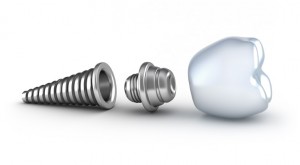
However, in order to get this benefit from dental implants, patients must have sufficient bone material to support the osseointegration process. In cases of significant bone loss, the implant can fail.
Unfortunately, bone loss often accompanies tooth loss, and patients who delay getting dental implants for years can lose a large amount of bone material. Also, bone loss progresses more quickly at the rear of the jaw, because the jaw is thinner in the area under the sinus cavities.
Although bone loss presents a challenge to dental implant placement, bone grafting can be a useful technique in allowing patients with extensive bone loss to become candidates for dental implants.
With bone grafting, an oral surgeon will remove bone from elsewhere in the body, like the hip or chin, and insert it at the implant site. Donor bone tissue can also come from other sources, like cadavers or synthetic materials.
If bone grafts are necessary, this may extend the overall dental implant treatment timeline, as the patient must heal from the bone graft before the implants can be placed. However, in such cases the wait is certainly worthwhile, as bone grafting improves the patient’s chances of long-term dental implant success.
Not all patients will need to have bone grafts before getting dental implants. In fact, with advances in the design of the devices and the surgical techniques used in placing them, dental implants can be placed in more patients than ever before.
Before oral surgery, the oral surgeon evaluates each case individually to determine whether a bone graft will be necessary. The surgeon will examine your mouth and take x-rays for a better perspective on the underlying bone structure.
If you are considering dental implants but are concerned about bone loss, bring this to your oral surgeon’s attention early in the process. The oral surgeon may recommend a bone graft to improve your chances of dental implant success.
For more information about bone grafting and dental implants, schedule an appointment with Great River Oral & Maxillofacial Surgery today.
